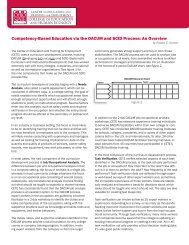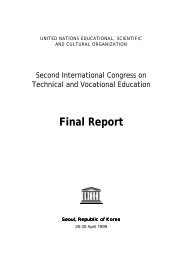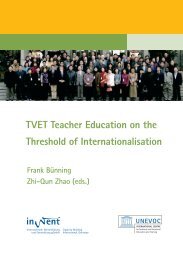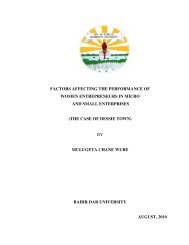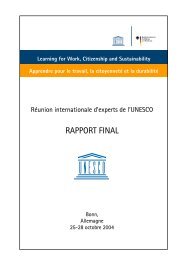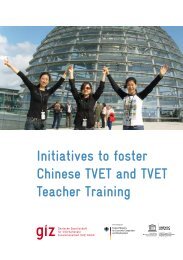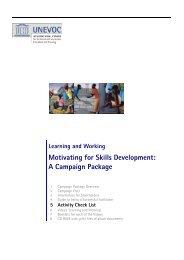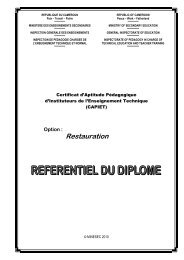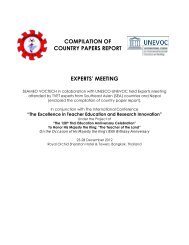FINAL Skills for Green Job Online Discussion Report.pdf - Unesco ...
FINAL Skills for Green Job Online Discussion Report.pdf - Unesco ...
FINAL Skills for Green Job Online Discussion Report.pdf - Unesco ...
Create successful ePaper yourself
Turn your PDF publications into a flip-book with our unique Google optimized e-Paper software.
Background of the Forum<br />
SKILLS AND EMPLOYABILITY NETWORK<br />
Asia-Pacific <strong>Skills</strong> and Employability Network<br />
Consolidated Response<br />
<strong>Skills</strong> <strong>for</strong> <strong>Green</strong> <strong>Job</strong>s<br />
November 15 - December 2, 2011<br />
During the last decades, climate change adaptation and mitigation policies have increasingly<br />
become critical drivers of change <strong>for</strong> societies, economies, enterprises and workers to shift to a<br />
low-carbon economy. A profound trans<strong>for</strong>mation in modes of production and consumption can<br />
be expected in the future. The growing importance of sustainable development and the pressure<br />
<strong>for</strong> each country to shift to a low-carbon, climate resilient economy also asks <strong>for</strong> well-integrated<br />
policy responses and adjustments in labour markets and the training and skills sector.<br />
According to an ILO/UNEP publication (2009), which is a part of the overall ILO <strong>Green</strong> <strong>Job</strong>s<br />
initiative, 1 jobs in all economic sectors are or will be subject to ‘greening’ and effect changes in<br />
enterprises and a redefinition of job profiles and qualifications. Millions of green jobs 2 already<br />
exist worldwide, and many millions more will be created if investments, policy support and<br />
appropriate skills development can be made available. Particular employment drivers in the Asia<br />
and the Pacific region are sectors such as renewable energy, energy efficiency, building and<br />
construction, transportation, agriculture based industry, tourism and recycling.<br />
Overall, new job opportunities arising from new low-carbon markets seem to offset<br />
unemployment, but those who will get green jobs are not necessarily those who will have lost<br />
their jobs. Low-skilled people are especially vulnerable as it will be difficult to compete <strong>for</strong> new<br />
jobs. Disadvantaged groups on the labour market need targeted assistance. Portable skills are<br />
getting a special value as they increase adaptation of workers and their occupational mobility.<br />
The recently published reports on skills <strong>for</strong> green jobs ILO-CEDEFOP (2010) 3 and the ILO<br />
Global Synthesis <strong>Report</strong> (2011) 4 discuss occupational changes, emerging skills requirements and<br />
shortages and assess the various responses from government, private sector and other<br />
stakeholders. While most countries are still in the process of identifying and defining the scope<br />
1 The <strong>Green</strong> <strong>Job</strong>s Initiative is a partnership between the ILO, United Nations Environment Programme (UNEP),<br />
the International Trade Union Confederation (ITUC), and the International Organization of Employers (IOE).<br />
http://www.ilo.org/public/libdoc/ilo/2009/447728.<strong>pdf</strong><br />
2 <strong>Green</strong> jobs help reducing negative environmental impact, ultimately leading to environmentally,<br />
economically and socially sustainable enterprises and economies. In practical terms, green jobs contribute<br />
to: reduction of energy consumption and use of raw materials, reduction of greenhouse gas emissions,<br />
minimization of waste and pollution, protection of ecosystems, while also meeting requirements of decent<br />
work- adequate wages, safe conditions, worker’s rights, social dialogues and social protection (ILO/UNEP<br />
2009).<br />
3 http://www.cedefop.europa.eu/en/publications/16446.aspx<br />
4 http://www.ilo.org/skills/pubs/WCMS_156220/lang--en/index.htm and<br />
1
and scale of ongoing changes, there are indications that occupational changes are taking place in<br />
practically all sectors and occupations, both blue and white-collar jobs. New and emerging<br />
occupations more often require higher-level qualifications and managerial skills, while changes<br />
in existing occupations happen more often at the low and medium-skill levels. Many existing jobs<br />
(i.e. plumbers, electricians, metal workers, and construction workers) will simply be redefined as<br />
day-to-day skill sets, work methods and profiles are ‘greened’.<br />
According to the ILO <strong>Skills</strong> <strong>for</strong> <strong>Green</strong> <strong>Job</strong>s <strong>Report</strong>, skills shortages are widespread and<br />
bottlenecks are noticed across existing and potential sectors and industries. They can be<br />
particularly acute in highly polluting industries, environmental industry and agriculture as well as<br />
in emerging energy sub-sectors (solar, photovoltaic, wind, geothermal) and in occupations<br />
dealing with energy efficiency in industry, construction and installation.<br />
Education and training systems are challenged to incorporate new skills demands in the<br />
development of qualifications, curricula and trainings in a coherent, well coordinated and<br />
integrated manner. The principal deficiency reported in public systems is weak responsiveness to<br />
changing industry needs. The reports concluded that countries with well-developed and<br />
responsive skills development systems have so far been more successful in systematically<br />
incorporating environmental considerations as cross-cutting issues in education and training at all<br />
levels. Countries that are succeeding in such a challenging task have also been placing a high<br />
premium on effective social dialogue, coordination among ministries and communication<br />
between employers and training providers. Labour market in<strong>for</strong>mation systems, institutions <strong>for</strong><br />
social dialogue and labour market mediation services are prerequisites <strong>for</strong> being able to anticipate<br />
future skill needs and to adapt skills development systems accordingly.<br />
Numerous countries in the Asia and the Pacific region have requested the ILO to provide support<br />
in policy and strategy development <strong>for</strong> green skills and green jobs. It is in this context that the<br />
ILO facilitated an online discussion on this highly relevant topic between 15 November and 2<br />
December 2011. The objective of this online <strong>for</strong>um was to discuss ongoing occupational changes,<br />
emerging skills requirements and shortages and assess the various responses from government,<br />
private sector and other stakeholders, which seek to ensure that workers have the adequate and<br />
right skills to be able to participate in a smooth transition towards a green, job-rich economy.<br />
The discussion had a particular focus on how developing countries, often hardest hit by climate<br />
change, could take advantage of such a transition process to address structural inequality, poverty<br />
and the high levels of vulnerability through concerted adaptation and mitigation ef<strong>for</strong>ts. The<br />
<strong>for</strong>um encouraged the sharing of good practices and a debate on the ongoing interventions<br />
currently applied within the region and globally. The <strong>for</strong>um invited ILO social partner<br />
representatives (Employers’ Organizations, Trade Unions and Government) and many experts<br />
from different backgrounds to participate and actively contribute and reflect on their role as<br />
change makers.<br />
The online <strong>for</strong>um was divided into two parts:<br />
Part 1 introduced the current skills <strong>for</strong> green jobs debate, which includes the definition of green<br />
jobs, emerging skills needs, skills gaps and occupational changes with up-skilling and retraining<br />
requirements that are most prevalent in the countries. The <strong>for</strong>um further discussed policy<br />
2
esponses by Government, ILO social partners and other critical stakeholders and which<br />
mechanisms were put in place to identify and address skills shortages. The first part reviewed the<br />
existing body of research on skills <strong>for</strong> green jobs in the region that has been recently built up by<br />
the ILO (and others).<br />
Part 2 aimed at a more in-depth discussion on interest areas raised by the <strong>for</strong>um members. The<br />
<strong>for</strong>um discussed country specific policies and practices, and how these can be adapted, scaled and<br />
replicated in other countries.<br />
Results of the <strong>Discussion</strong><br />
Defining and measuring of <strong>Green</strong> <strong>Job</strong>s and <strong>Skills</strong> <strong>for</strong> <strong>Green</strong> <strong>Job</strong>s<br />
The <strong>for</strong>um started with clarifications on the definition of green jobs. It was found that the<br />
definition needs to be better understood by a large number of people as many countries are still<br />
grappling with their own categorizations and<br />
understanding under green jobs and related skills<br />
requirements. The ILO and the international<br />
community are in the process of developing a<br />
comprehensive list of green jobs and plan to<br />
integrate the same in the national and international<br />
lists of occupations (ISCO). As several<br />
contributions indicated, there is a growing<br />
consensus that the current transition into a green<br />
and more equitable society will affect all sectors<br />
and occupations, which consequently turn into green and decent jobs. <strong>Green</strong>ing of jobs is a<br />
gradual process that never stops.<br />
The definition includes a wide spectrum of jobs, which address both sustainability and decent<br />
work (see box). <strong>Green</strong> jobs are jobs in environmentally friendly sectors that contribute to all<br />
aspects of environmental sustainability including reducing carbon emissions, protecting<br />
biodiversity and ecosystems and adaptation to climate change. From an economic point of view,<br />
green jobs encompass those jobs that produce 'green products and services'. Most developed<br />
countries use this framework as a reference but differ when it comes to categorization and listing<br />
of services and products. Examples of green products are the production of water-efficient valves<br />
to be used in the green building industry, equipment in the renewable energy sector, certified<br />
wood products or organic food, etc. <strong>Green</strong> services include R&D, in<strong>for</strong>mation/training,<br />
education, en<strong>for</strong>cement, but also consulting, or retailing of green products.<br />
It was further suggested that measurement tools start integrating employment and job potentials<br />
and assess the impact on reduced carbon footprints or climate change. The CSR compliance and<br />
the development of voluntary instruments and codes have increasingly adopted such tools as they<br />
integrate social, environmental aspects into economic per<strong>for</strong>mance. International labour standards<br />
(including the 8 ILO core labour standards) have increasingly been integrated to cover the labour<br />
part.<br />
3<br />
What are green jobs?<br />
<strong>Job</strong>s are green when they help reduce negative environmental<br />
impact ultimately leading to environmentally, economically<br />
and socially sustainable enterprises and economies. More<br />
precisely green jobs are decent jobs that:<br />
- Reduce consumption of energy and raw materials<br />
- Limit green house gas emissions<br />
- Minimize waste and pollution<br />
- Protect and restore ecosystems
Emerging trends <strong>for</strong> green jobs, sectors and skills needs<br />
Contributions from Trinidad & Tobago, Australia, Spain, India and Bangladesh re-affirmed the<br />
global reports’ findings of current occupational trends, the overall potential positive employment<br />
effects and increasing skills needs and gaps in all the sectors and in emerging occupations in<br />
particular. These include tourism, hospitality and related supply chains, besides the fast<br />
expansion of organic agriculture and food, fishing and processing, re-<strong>for</strong>estation, renewable<br />
energy, construction, waste and recycling sector. Additionally, the overall demand <strong>for</strong> green<br />
management and education jobs will grow and provide employment opportunities, if policies are<br />
specifically drafted and incentives set <strong>for</strong> investments.<br />
Extract, Case of Spain:<br />
In the case of Spain, while shifting towards more environmentally responsible production methods, two<br />
different skills gaps have been identified. First, there is a capital greening gap, which could be narrowed<br />
by increasing energy efficiency through capital substitution (generally involving technological change).<br />
Second, there is a non-capital greening gap, which could be addressed by increasing energy efficiency<br />
through organizational changes or improving attitudes of workers. As an example, a capital greening gap<br />
would be the change in agriculture from old harvesters to new and less polluting ones.<br />
By contrast, an example of a non-capital greening gap would be switching off the lights in office buildings<br />
when they are not in use. Closing this noncapital greening gap involves training in conceptual skills, such<br />
as environmental awareness. A non-capital greening gap could be found in almost every occupation from<br />
farmers to highly-qualified white-collar workers, and this is one of the key challenges <strong>for</strong> greening the<br />
economy. Thus, conceptual skills training responses, such as awareness campaigns, should continue and<br />
perhaps incorporate new training methods (source: Alberto Martinez, Spain).<br />
Contributions from developing countries emphasized the need <strong>for</strong> universal education as a<br />
priority, while future skills needs (i.e. generic skills which incorporate skills related to<br />
sustainability, environment related aspects) are critical <strong>for</strong> the new generation to ensure their<br />
employability.<br />
Several contributions pointed out that overall the education and training sector has to be demand<br />
oriented – a challenge of the overall training system to ensure employability of the work<strong>for</strong>ce.<br />
Consequently, educational and vocational training needs should be systematically assessed and<br />
integrated and required adjustments need to be made to make the status of vocational training<br />
more attractive. The required competencies <strong>for</strong> economic productive activities overall require<br />
environmental management and affect various sectors and there<strong>for</strong>e need to be addressed across<br />
sectors in close consultation with industry.<br />
Apart from this social issue, many technical and vocational jobs require retraining in modern<br />
techniques to reduce and minimize pollution, promoted energy conservation products and<br />
procedures, procurement and life skills in all the occupations and sectors, which have been<br />
identified by governments as strategic sectors. Contributions from India referred to the changing<br />
skills requirements of engineers, scientists and managers in the future.<br />
4
A coordinated ef<strong>for</strong>t is suggested to train persons in the various disciplines making “green” a<br />
mandatory part of the curricula and increase the overall awareness of the population on these<br />
aspects.<br />
Policy Responses:<br />
Most of the contributions confirmed that environmental policies and regulations have<br />
increasingly become a priority in their country, but<br />
often lack well-coordinated strategies and effective<br />
mechanisms and institutional capabilities <strong>for</strong><br />
successful implementation. Initial policy responses<br />
tend to start with environmental policies, re<strong>for</strong>estation<br />
and conservation. It seems that in fewer cases, climate<br />
change and adaptation policies are strategically<br />
planned and integrate employment and skills related<br />
aspects. It was also mentioned that though many<br />
developing countries increasingly prioritize<br />
‘greening’ as a part of the development paradigm,<br />
they still follow the traditional resource intensive<br />
development path instead of taking a bold step towards an integrated approach <strong>for</strong> greening their<br />
economy. The argument was also made that <strong>for</strong> emerging and poorer economies, where in many<br />
instances production processes are dictated by international markets, labour market institutions<br />
and vocational training systems need to be strengthened as else, it will be challenging to make an<br />
immediate shift towards a green economy.<br />
The contributions from Trinidad & Tobago, India, Bangladesh, Australia and Spain emphasized<br />
the need <strong>for</strong> more binding and stringent laws, the need <strong>for</strong> empowered institutions and<br />
en<strong>for</strong>cement mechanisms so that current policies are effectively implemented. Most contributions<br />
emphasized the need <strong>for</strong> a stronger role of governments and the business sector as critical. The<br />
<strong>for</strong>um contributions from Spain and Australia clearly referred to the need <strong>for</strong> strong political will<br />
and multi-stakeholder involvement that is required <strong>for</strong> a paradigm shift. Organizational and<br />
institutional changes are as important as investments, which need to be taken into account.<br />
The contributions on government responses were particularly insightful <strong>for</strong> the countries,<br />
Australia, Trinidad & Tobago and Spain. Australia’s current ef<strong>for</strong>ts clearly refer to <strong>Skills</strong> <strong>for</strong><br />
5<br />
Most <strong>for</strong>um members indicated that<br />
climate change and environmental policy<br />
responses often do not integrate<br />
employment and skills related policies.<br />
Further, they lack systematic planning <strong>for</strong><br />
climate change and fall short of human<br />
resource planning and trained people to<br />
effectively implement these policies.
Sustainability which embrace the ILO’s green jobs definition. One of the contributors felt that<br />
there is a need <strong>for</strong> sector specific skills responses by government and key stakeholders <strong>for</strong> green<br />
jobs and skills development and referred to the case of Bangladesh’s skills shortages in their<br />
current ef<strong>for</strong>t on building up solar power systems, which requires 20,000 skilled workers to<br />
service energy needs in rural Bangladesh.<br />
Other government responses successfully implemented programmes, targeting vulnerable groups<br />
through green jobs initiatives (the urban and rural poor, youth, unemployed) with the objective to<br />
accelerate more inclusive and sustainable growth. Many countries, with China, Japan and the<br />
Republic of Korea in the lead, have, as a part of their crisis response packages, actively promoted<br />
green job creation (e.g. Republic of Korea, China, Australia, Indonesia), and in some cases,<br />
Extract, Case of Australia’s <strong>Skills</strong> <strong>for</strong> Sustainability:<br />
A number of policies and initiatives have been put in place to facilitate the development of the skilled and<br />
qualified work<strong>for</strong>ce that Australia will need to sustainably grow its economy.<br />
One key example is the <strong>Green</strong> <strong>Skills</strong> Agreement, which was led by the Prime Minister’s office and endorsed by<br />
the Australian, state and territory governments in late 2009. A multi-stakeholder task<strong>for</strong>ce convened a Working<br />
Group that comprised of key representatives from state and territory governments, peak industry groups, unions,<br />
the tertiary education sector, community groups and Industry <strong>Skills</strong> Councils (ISCs). The mandate given to this<br />
group is to draft an agreement which is a statement of commitment to work collaboratively with employer and<br />
employee representatives, the vocational education and training sector (VET) and community organizations to<br />
ensure that training in skills <strong>for</strong> sustainability is an integral part of the national VET system and is relevant to the<br />
needs of industry.<br />
Major achievements under the Agreement to date, include the embedding of skills <strong>for</strong> sustainability in all<br />
relevant Training Packages; the development of a new sustainable practice skill set to underpin professional<br />
development <strong>for</strong> VET practitioners; and the undertaking of pilot projects to identify new green opportunities <strong>for</strong><br />
vulnerable workers in regions that may be affected as Australia transitions to a cleaner economy.<br />
Additionally, through its commitment to ensure Australia secures a clean energy future, the Australian<br />
Government announced the Clean Energy and Other <strong>Skills</strong> package in July 2011, which will provide training<br />
opportunities <strong>for</strong> both professionals and trades people to up skill in energy efficiency and clean energy skills, so<br />
that the work<strong>for</strong>ce is prepared to take up the opportunities af<strong>for</strong>ded by the transition to a cleaner, greener future.<br />
At an international level, Australia supports the green growth agenda, and specifically, the ILO’s <strong>Green</strong> <strong>Job</strong>s<br />
Agenda and has committed to providing funding <strong>for</strong> two years <strong>for</strong> the <strong>Green</strong> <strong>Job</strong>s in Asia Project.<br />
(Source, Natalie Mc Kinlay; Asha Sharma, Australia)<br />
linked these targets with training and re-training initiatives (e.g. Denmark, Ireland, Switzerland).<br />
Training and re-training, however, are with some exceptions, still marginally addressed. Some of<br />
the green stimulus packages tried to link green investments and policies with job and green jobs<br />
creation targets, which is something to be underlined. Such sectors and activities as re<strong>for</strong>estation,<br />
river management, public transport, water and waste systems were promoted in countries like the<br />
Philippines, South Korea, Australia, Indonesia, Bangladesh and China. In this regard, public<br />
investments in collective assets and infrastructure remain a very important driver <strong>for</strong> the<br />
expansion of environmentally friendly economic activities with decent jobs.<br />
6
One can expect additional employment creation through interventions designed to develop socioeconomic<br />
resilience against the adverse impacts of climate change in the coming years. The Asia<br />
Pacific region is particularly vulnerable to such risks and investments are required to improve<br />
irrigation and watershed management in rural areas, protect low-lying areas to prevent erosion,<br />
floods, and sea invasion as it will be the case in exposed many mega polis in the region such as<br />
Shanghai, Manila, Mumbai, Bangkok, Jakarta and others.<br />
The business sector has been identified as critical to ensure effective implementation and has in<br />
many countries increasingly been a driver in promoting the greening of the economy and<br />
identifying new business niches <strong>for</strong> the future. The <strong>for</strong>um addressed the importance of joint<br />
collaboration between the government and private sector to take a strategic step towards cleaner<br />
production and consumption. It was emphasized that enterprises, which have initiated a long-term<br />
process to green their supply chain and improve productivity with a changing working culture,<br />
occupational safety and health mechanisms and training of their work<strong>for</strong>ce need to be supported<br />
by balanced policies to provide the legal and institutional framework <strong>for</strong> compliance to labor and<br />
environmental standards. However, it is finally their buy into the overall vision and long-term<br />
business perspective, which changes the culture of the enterprise. It requires a gradual shift with a<br />
strong corporate vision, where the work<strong>for</strong>ce is continuously engaged and motivated to take this<br />
process <strong>for</strong>ward. In such a case, workers can benefit from a cleaner, more pleasant and safer<br />
workplace and are able to take pride in being part of an organization that takes sustainability<br />
issues seriously.<br />
Sustainable Development as overarching theme and new paradigm<br />
For several <strong>for</strong>um members a paradigm shift is required, which is embedded in much broader<br />
system related changes that are required in the entire society to ensure a transition towards a more<br />
sustainable economy. Consequently, it was argued that the creation of jobs in the emerging <strong>Green</strong><br />
economy should not be just a case of providing employment but should be a subset of sustainable<br />
development policies and strategies nationally and internationally. Promoting sustainable<br />
development means changing and adapting current growth pattern to new models so that the<br />
society will begin to see changes in its lifestyle and working habits in the coming years. Such a<br />
new paradigm needs to effectively address these changes through economic and institutional<br />
ef<strong>for</strong>ts in production and other traditional sectors, educational and knowledge sector and strong<br />
support from public administration.<br />
Members from Bangladesh, Trinidad & Tobago and India see current challenges in policy<br />
coherence, lack of strategic planning and effective implementation, as there are no proper<br />
systems <strong>for</strong> en<strong>for</strong>cement of policies and laws. Many times the reluctance by both private and<br />
public enterprises in adopting many ‘green’ practices exists because it was and still is not<br />
mandatory.<br />
Systemic changes and policy coherence<br />
As several contributions suggest, there is a need <strong>for</strong> an overall system change that reviews the<br />
entire current development and economic paradigm to ensure that overall policies, strategies and<br />
implementation support the shift towards sustainable and more equitable inclusive development.<br />
7
There are indications that in many countries, the training and education system are not<br />
sufficiently prepared <strong>for</strong> these shifts, while the private sector has increasingly taken on the proactive<br />
role to meet these needs in many countries. Till date, very few countries have taken the<br />
strategic step to integrate greening skills competencies <strong>for</strong> employment into their environmental<br />
policies and strategies. While latter are well developed, skills and employment related aspects are<br />
mentioned but not part of an overall strategy.<br />
Further, there are needs <strong>for</strong> better-integrated inter-ministerial and multi-stakeholder coordination<br />
and commitment to seriously pursue sustainability. Consequently, as pointed out by several<br />
contributions, any strategy, intervention, whether at the planning level or at the company level<br />
will need to shift towards a modus operandi that clearly reflects a sustainability culture and<br />
includes the various environmental as well as the social aspects of decent work.<br />
<strong>Skills</strong> <strong>for</strong> Sustainability and Lifelong Learning<br />
The <strong>for</strong>um addressed the close connection between sustainable development and the knowledge<br />
economy, <strong>for</strong> which primary, secondary and higher<br />
education appear to be basic requirements <strong>for</strong> success and<br />
there<strong>for</strong>e high priority areas <strong>for</strong> developing countries.<br />
Australia has, as a part of the strategy defined <strong>Skills</strong> <strong>for</strong><br />
sustainability’ as “the technical skills, knowledge, values<br />
and attitudes needed in the work<strong>for</strong>ce to develop and<br />
support sustainable social, economic and environmental<br />
outcomes in business, industry and the community.”<br />
The Australian Government’s focus on skills <strong>for</strong> sustainability recognizes the critical importance<br />
of education, training and skills development in creating an innovation culture and building<br />
capability to drive green growth, sustainable development and a just transition to a low carbon<br />
economy.<br />
Contributions from Trinidad and Tobago observed the overall low levels of awareness about<br />
sustainability and ‘green’ in society. Some <strong>for</strong>um members suggested that government and<br />
private enterprises should increase investment into overall awareness of the population to make<br />
more in<strong>for</strong>med decisions on their course of study as well as the areas where employment<br />
opportunities exists.<br />
References were made to the current UNESCO programme on Education <strong>for</strong> Sustainable<br />
Development (ESD), which supports member states to integrate sustainable development in the<br />
educational system. A strong connection needs to be made between lifelong learning and skills<br />
<strong>for</strong> sustainability. According to one contribution, education and training programmes need to:<br />
1. Develop an understanding of a range of environmental concepts<br />
2. Encourage reflection on the effects of personal attitudes, values and lifestyle choice;<br />
3. Promote skills <strong>for</strong> critical thinking and practical action.<br />
8<br />
Environmental education is critical at<br />
all levels of the educational system<br />
and needs to be extended beyond the<br />
classroom to society to increase<br />
environmental awareness. Quality of<br />
environmental education and<br />
effectiveness must be carefully<br />
monitored, whether it has an impact<br />
on actual behavioral change.
The generic and core work skills include critical thinking and practical problem solving skills and<br />
need to be enhanced to promote environmental sustainability.<br />
The <strong>for</strong>um briefly addressed that the effectiveness and quality of the overall increased<br />
investments into environmental education needs to be systematically monitored and assessed as<br />
recent research studies (A Policy and Practice Review Tool JOHN FEIN:<br />
http://unesdoc.unesco.org/images/0019/001908/190898e.<strong>pdf</strong> ) suggest.<br />
Concluding Remarks<br />
The discussion <strong>for</strong>um overall touched upon many broad definitional and policy related aspects of<br />
the current green jobs and skills <strong>for</strong> sustainable development debate and emphasized the need <strong>for</strong><br />
further research on definitions, measurement and employment and skills related aspects.<br />
Overall, there seems to be a consensus that all sectors and occupations will undergo changes in<br />
the transition process and will rely on new technologies and related organizational and<br />
managerial, technical and generic ‘green’ skills, which increasingly report shortages.<br />
Implementation and en<strong>for</strong>cement of current policies and strategies seem besides policy coherence<br />
and integration of employment and skills policies to be the current challenges <strong>for</strong> developing<br />
countries. An enabling policy environment and political will of government/stakeholders are<br />
besides the institutional capacities critical <strong>for</strong> a paradigm shift.<br />
The overall awareness of the population about sustainability needs to increase through campaigns<br />
and the mandatory integration of sustainability and environment aspects in the educational and<br />
TVET system and their relevance and effectiveness assessed and monitored. Strategies <strong>for</strong> skills<br />
<strong>for</strong> green jobs need to be demand driven and introduce new pedagogies to ensure that skills lead<br />
to higher employability of the work<strong>for</strong>ce.<br />
9



